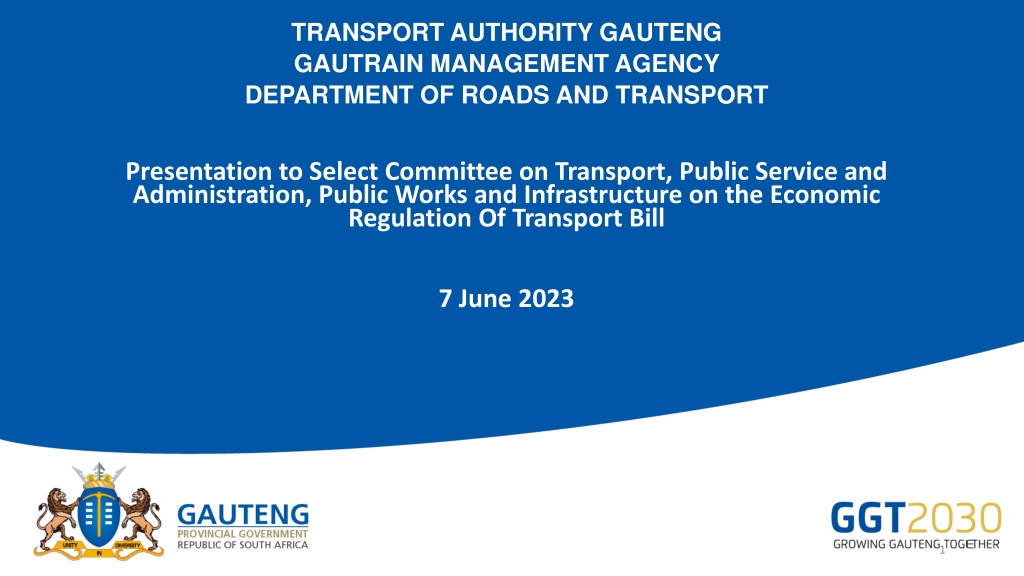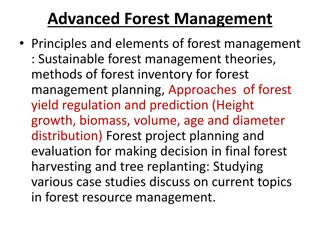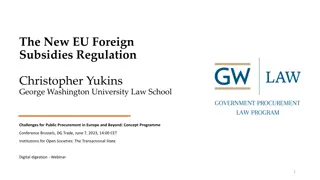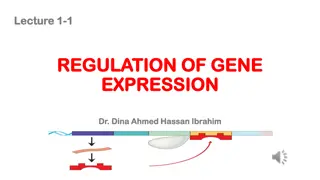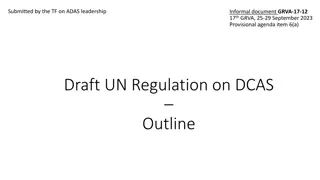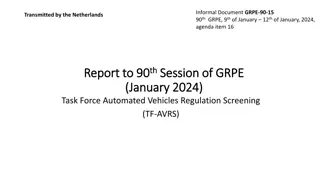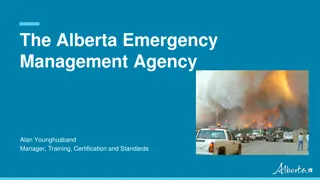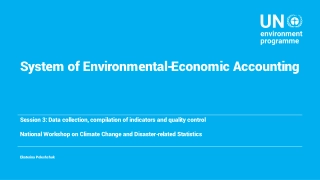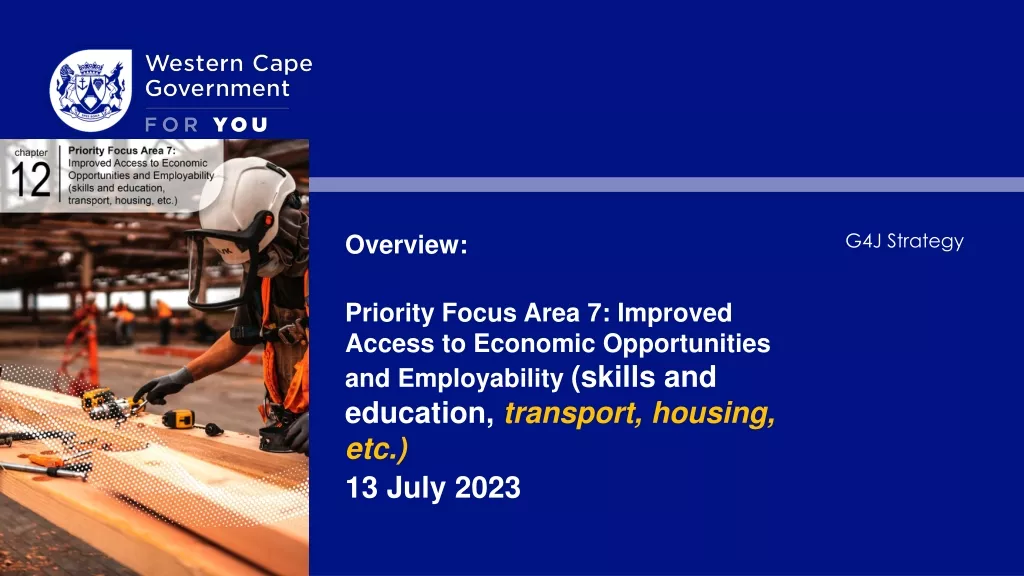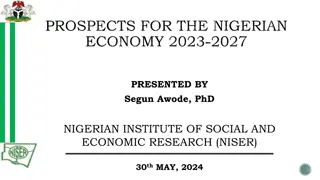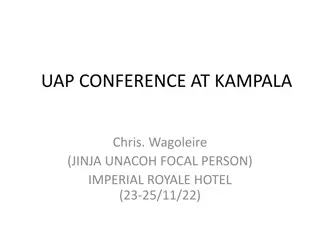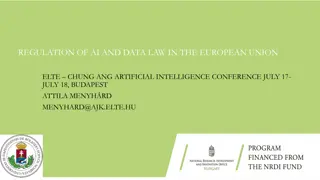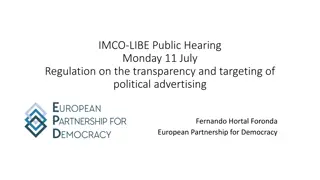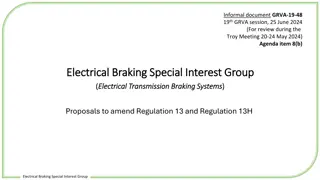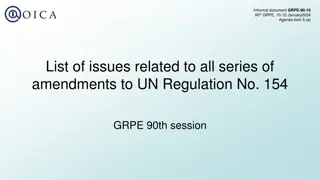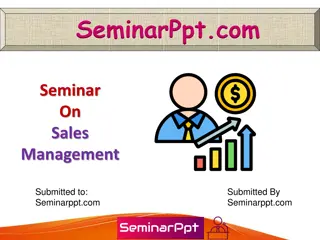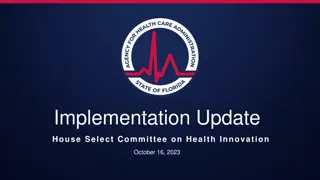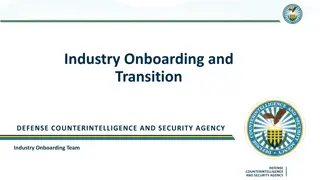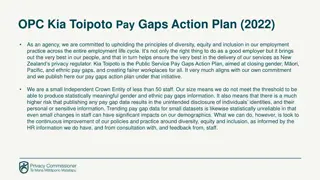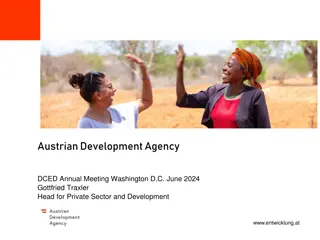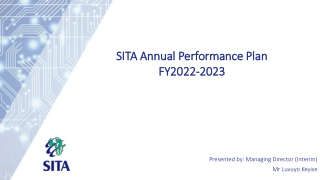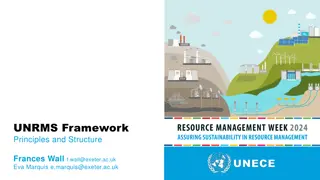Gautrain Management Agency Economic Regulation Presentation
The presentation by the Gautrain Management Agency, in collaboration with the Gauteng Department of Roads and Transport and Gauteng Transport Authority, emphasizes the importance of economic regulation in the public transport sector. It discusses the support for the User Pays Principle, private sector involvement, and the benefits of Public-Private Partnerships in infrastructure development.
Download Presentation
Please find below an Image/Link to download the presentation.
The content on the website is provided AS IS for your information and personal use only. It may not be sold, licensed, or shared on other websites without obtaining consent from the author. Download presentation by click this link. If you encounter any issues during the download, it is possible that the publisher has removed the file from their server.
Presentation Transcript
TRANSPORT AUTHORITY GAUTENG GAUTRAIN MANAGEMENT AGENCY DEPARTMENT OF ROADS AND TRANSPORT Presentation to Select Committee on Transport, Public Service and Administration, Public Works and Infrastructure on the Economic Regulation Of Transport Bill 7 June 2023 1
1. INTRODUCTION The Gautrain Management Agency submitted written comments on the Bill on 27 April 2023 Since that date we have been able to canvas the views of the Gauteng Department of Roads and Transport and the Gauteng Transport Authority and the presentation that follows incorporates these views As such we request that it be treated as a joint submission between these three Organs of State
1. INTRODUCTION The Gauteng Provincial Government views the provision of an efficient and cost- effective public transport system as being critical to economic growth and the realisation of the country s social goals, and thus welcome and support economic regulation of transport The GMA, TAG and GDRT operate primarily in the arena of public transport (as opposed to the movement of goods and commodities) The Province thus sees the need to strike a careful balance between safe and secure public transport operations, as well as the provision of reliable and seamless transport services, and the economic imperatives underlying the Bill as being fundamental to a sustainable regime of economic regulation of the sector
2. General Comments It is common knowledge that all spheres of Government in South Africa support the User pays Principle and the involvement of private sector participation in infrastructure is also supported in order to help bridge the so called infrastructure gap "where government alone cannot provide all the A fundamental cornerstone and application of this principle is the design and development of Public-Private-Partnership type contracts. To support this initiative National Treasury has develop legislation and regulations around PPP type contracts (Schedule 16 of the PFMA) and established a PPP Section in Treasury to oversee the development of these contracts. One of the big advantages of this type of contract is that the private sector forms a long term partnership with Government to design, construct, operate, maintain and partially fund infrastructure projects. The advantage for government is that: The private sector invests in a project and brings world-best-practises to bear in delivering the project Takes full responsibility for the life-cycle costs of the project; The contingent liability of Government, over the life of the project, is known (and can be budgeted)
2. General Comments For the private sector (local and international) to show an appetite to participate in these long term contracts they must: be sure of the sustainable income or funding of the project, over the life of the project. The risks associated with the project must be known, quantified, and allocated to the entity that is best equipped to mitigate the risks in terms of enforceable contracts Any lack of certainty in these contracts or risk as to the sustainable income or funding may make these projects un-bankable and fail to attract any viable bidders or even to fail after contracts are signed A key part of the sustainable income for many PPP projects is the funds generated from the user-pays principle and if this is not a sufficient cash-flow for servicing the financial requirements then Government will have to augment this cash-flow In the case of a Design-Build-Operate-Maintain type PPP a large amount is spent (and financed) by the Concessionaire, before the public can use the facility. If, after the facility has been commissioned , the Economic Regulator is approached by a commuter with a request for access and or determining an affordable fare, the financial model, as developed by the private sector party, will become invalid
2 General Comments The role of the Economic Regulator for Transport If, after the facility has been commissioned, the Economic Regulator is approached by a commuter with a request for access and or determining an affordable fare, which is lower than the fares agreed upon in the financial model, as developed by the Concessionaire, the conditions of the CA will be breached and Government will be in default of the CA or Government would have to intervene to top up the income that was lost This will have a far reaching impact on the contingent liability of Government and could lead to the termination of the contract. The question can be asked whether this Economic Regulator Bill should be applicable to public transport as a sector and PPP type contracts as a form of procurement?
2. General Comments Consequently, we recommend that the Bill be explicit in its : Applicability to public transport and PPP projects acknowledgment of the importance of striking the balance between user pays revenue and government subsidy care taken in deciding on access to networks by requiring that the Transport Economic Regulator and/or Transport Economic Council consult with relevant regulatory bodies, who are mandated to regulate the provision of safe, secure, and reliable transport operations/ services prior to deciding on access requests and disputes between access seekers and infrastructure or facility owners. We view this as being important to ensuring that safe, secure, and reliable operations are not compromised in the name of economic regulation.
2. General Comments The Province, further, observes that the Bill is not very clear on the envisaged relationship between the Competition Commission and the Transport Economic Regulator, i.e. whether the Bill is intended to merely supplement the Competition Act, 1998 (Act No. 89 of 1998), thus whether the transport sector will still be subject to the Competition Act in relation to matters that the Competition Act provides for. In addition to this, it is not clear which of the two Acts or regulatory authorities will prevail in the event of a conflict, i.e. if the Competition Act or the Economic Regulation of Transport Act will be applicable in such eventuality.
2. General Comments The Bill could play a role in decongestion, by promoting modal shifts both in passenger & road freight movements through congestion charges, that is, based on corridor network determined cost modes and ensure that resultant pricing is related to these costs. Bill states that Regulator must promote public awareness & increase knowledge of the economic nature & dynamics of the transport market and when communicating with the public, the Regulator must employ effective means of disseminating information, including freely accessible internet publishing. However, will the information be freely accessible? This is not clearly elaborated in the Bill. The Bill must elucidate on consequences where information that is in the public interest is withheld by transport entities, sectors & services.
2. General Comments Bill states that NDOT will assist in implementation phases. However, implementation phases are not defined. It is recommended that the Minister should define implementation phases in the regulations with timelines to allow the Regulator and Council operate independently.
3. Specific Comments NO. RELEVANT STATUTORY HEADING 1 Definitions RELEVANT STATUTORY REFERENCE RECOMMENDATION GDRT S COMMENT Section 1: Definition of access It is not clear whether it is the intention of the Legislature that a resource is envisaged to include human capital in areas of scarce skills, e.g., intelligent transport systems. If this is the intention, the Select Committee is entreated to take cognisance of practical challenges which this could pose about the protection of confidential information of the organisation whose employee is seconded to an access seeker , and operational difficulties that the former could be faced with whilst its employee is seconded under an access agreement . Explicit clarification of whether it is the intention of the Legislature that a resource includes human capital. If yes, provision of guidelines on possible measures that could be implemented to safeguard the confidential information of the organisation that employs the resource and prevent the detrimental impact of the absence of such a resource on the employer organisation, whilst an employee is seconded to an access seeker .
3. Specific Comments NO. RELEVANT STATUTORY HEADING 1 Definitions RELEVANT STATUTORY REFERENCE RECOMMENDATION GDRT S COMMENT Section 1: Definition of access agreement The meaning of the phrase: facility of an infrastructure or (own emphasis) is not clear, given the fact that infrastructure is already included in the definition. Deletion of the phrase: an infrastructure or , between the words facility and resource owner , so that that part of the definition reads: access seeker to the infrastructure, resource or facility of a resource owner . As per our comment on the above definition, we recommend that a resource be qualified concerning the intention of the Legislature and inherent risks, as highlighted above. Definition of confidential information This definition does not seem to go far enough, especially so, about organizations whose mandates are to merely provide a service, as opposed to running a profitable business. Inclusion of other categories of potentially sensitive information, such as operational plans etc.
3. Specific Comments NO. RELEVANT STATUTORY HEADING 1 Definitions RELEVANT STATUTORY REFERENCE RECOMMENDATION GDRT S COMMENT Section 1: Definition of goods or services The citation of the term being defined in the definition (not once but twice) complicates the definition. Amplification of the definition, to make it more user-friendly. Definition of confidential information This definition does not seem to go far enough, especially so, about organizations whose mandates are to merely provide a service, as opposed to running a profitable business. Inclusion of other categories of potentially sensitive information, such as operational plans etc. Definition of a market The definition, as is, seems to denote a physical marketplace, even though the context in which it is used, in the Bill, has an economic connotation with reference, for example, to a market segment or market share. Amplification of the definition with express reference to a particular mode of transport; class of services rendered; percentage of consumers within a particular mode of transport or who use a particular class of services; or an entity s market power within the subsector within which it operates.
3. Specific Comments NO. RELEVANT STATUTORY HEADING 1 Definitions RELEVANT STATUTORY REFERENCE RECOMMENDATION GDRT S COMMENT Section 1: Definition of a prohibited conduct It is not immediately clear whether the duplication of the reference to price control, in (a)(ii) and (b)(i), bears any particular significance. The fact that (a)(ii) relates to the contravention of conditions attached to the price control, while (b)(i) deals with a charge that is greater than the amount allowed under price control only becomes evident upon closer scrutiny of these provisions. This is especially so, given the fact that both provisions holistically and ultimately imply Contravention of a price control determination. Consolidation of (a)(ii) and (b)(i).
3. Specific Comments NO. RELEVANT STATUTORY HEADING 1 Definitions RELEVANT STATUTORY REFERENCE RECOMMENDATION GDRT S COMMENT Section 1: Definition of a regulatory authority Given the fact that a regulated entity cannot, in the same breath, be a regulatory authority , the significance or necessity of the phrase: , but does not include a regulated entity in terms of this Act is not clear. Deletion of the phrase: , but does not include a regulated entity in terms of this Act .
3. Specific Comments NO RELEVANT STATUTORY HEADING RELEVANT STATUTORY REFERENCE RECOMMENDATION GDRT S COMMENT Interpretation 2(2) The words: signing or initialling seem to dilute the grammatical soundness of the provision. It would seem that their omission would enhance the syntax of the provision. Deletion of the words: signing or initialling . 2. 2(4) This provision gives the Bill precedence over any transport legislation, on matters dealt with in the Bill. Because a dispute on an access agreement could be rooted in legislation that is not transport-related, e.g. the Conventional Penalties Act, it is not clear whether the restriction to transport legislation, particularly on matters relating to the primary objects of the Bill, e.g. disputes on access agreements, is deliberate. Instead of focusing on transport legislation, it is recommended that this provision should rather focus on facilitating the achievement of the objects of the Bill, by specifying matters on which the Bill takes precedence, as opposed to particular legislation.
3. Specific Comments NO RELEVANT STATUTORY HEADING RELEVANT STATUTORY REFERENCE RECOMMENDATION GDRT S COMMENT Purpose of Act 3(1)(a) The use of the term: transport industry is inconsistent with the defined term: transport sector which is consistently used throughout the Bill Substitution of the word: industry for the word: sector . 3. It is common cause that any economic sector, the transport sector included, contributes to economic growth and development, thus the phrase: contributing to economic growth and development , at the end of this provision, is unnecessary. Deletion of the phrase: contributing to economic growth and development .
3. Specific Comments NO RELEVANT STATUTORY HEADING RELEVANT STATUTORY REFERENCE RECOMMENDATION GDRT S COMMENT Purpose of Act 3(1)(c) Reliability, safety, and performance are currently regulated by the likes of the Railway Safety Regulator, Civil Aviation Authority, and South African Maritime Authority. It is not clear whether by including reliability, safety and performance , the Legislature intends to do away with these regulators or curtail their mandate. It would seem, though, that reliability, safety, and performance fall outside the professed objects of the Bill. Omission of the words: reliability, safety, and performance in this provision. 3. 3(1)(e) Without qualification, someone could interpret the enhancement of transparency, envisaged in the Bill, liberally, to get access to others confidential information. Inclusion of a proviso to the effect that transparency will be enhanced, subject to the protection of confidential information and provided that the information concerned can be legitimately accessed, in line with the provisions of the Bill.
3. Specific Comments NO RELEVANT STATUTORY HEADING RELEVANT STATUTORY REFERENCE RECOMMENDATION GDRT S COMMENT Application of Act 4(1) The applicability of this provision to rail is not clear, despite Chapter 2 which is dedicated to the economic regulation of rail, is contrary to the professed object of the Bill to ensure the economic regulation of all modes of transport. Also the applicability to public transport is not clear Review of the provision to provide clarity on applicability to rail and public transport 4. 4(2) This provision has a lot of uncertainty, as it has ministerial discretion based on the interpretation of what a market is and concepts of efficiency and cost- effectiveness. It would be better, if section 4(2) were clearer, in its definition of markets, which have, in all probability, been already identified. Clearer the definition of markets in this provision, to cure the uncertainty.
3. Specific Comments NO . RELEVANT STATUTORY HEADING RELEVANT STATUTORY REFERENCE RECOMMENDATION GDRT S COMMENT Application of Act 4(7) The requirement that the Minister grants an exemption in consultation with the Regulator (own emphasis) may lead to deadlocks that grind decision- making to a halt, as the term: in consultation with denotes that the Minister and the Regulator must agree, whereas the term: after consultation with , denotes that the Minister will have the discretion in the event of the Minister and the Regulator not reaching agreement on an exemption. Substitution of the phrase: in consultation with the Regulator for the phrase: after consultation with . 4. 4(7)(a) As a check and balance against the erroneous granting of exemptions and cronyism, it is important that the process envisaged in this provision be transparent and includes the participation of other stakeholders. As the Minister s decision will constitute an administrative action, the participation of affected stakeholders will, amongst others, obviate any possible challenges that may be triggered by PAJA. Inclusion of a process in terms of which other stakeholders, within the transport sector, and experts are, through a gazette, invited to comment on, or even object to, a pending exemption.
3. Specific Comments NO . RELEVANT STATUTORY HEADING RELEVANT STATUTORY REFERENCE RECOMMENDATION GDRT S COMMENT Application of Act 4(10)(a) We recommend that the Regulations envisaged in this provision should also include the public participation process recommended above. Inclusion of the proposed amendment of section 4(7)(a) on the list of Regulations that the Minister may make. 4. 5. Determination of access costs and review of access agreements 5(3) Given that PPP agreements are subject to comprehensive approval processes stipulated in the regulatory framework applicable to them, including checks and balances contained in the PFMA and Treasury Regulations, the provision should take into account such processes and be aligned with them. Undoubtedly such a review exercise will not only be cumbersome but can also lead to possible disputes or even termination of such agreements, especially in instances where the parties do not agree on the imposition of certain contractual terms, ex post facto. In the case of Gautrain, this will have huge and unimaginable implications. Specification that once a review reveals that a PPP agreement is not compliant with the legislative requirements, outlined in this Bill, then the infrastructure owner is obliged to rectify the noncompliance when the agreement is due for renewal or renegotiation.
3. Specific Comments NO. RELEVANT STATUTORY HEADING RELEVANT STATUTORY REFERENCE RECOMMENDATION GDRT S COMMENT 5. Determination of access costs and review of access agreements The rationale behind the requirement that an infrastructure owner submits all existing agreements , which would, for example, include corporate agreements for the supply of stationery, is not clear. It would be understandable if the provision were to only require the submission of agreements that relate to rail infrastructure and rail facilities. Qualification of the phrase: all existing agreements to restrict its meaning to agreements that relate to rail infrastructure and rail facilities. In addition to the comments above, it should be noted that a review of existing agreements, to determine contractual provisions that are inconsistent with the Act might be an extensive project that will be costly and drawn out. Annual budgets may already have been finalised, when the Act comes into effect, delaying the initiation of procurement processes for the review of such agreements by a couple of months. The review of existing agreements envisaged in this clause may not be easily effected, in the case of a PPP, as material amendments to a PPP agreement require regulatory approvals by the National Treasury (as per PPP Regulations). With reference to the duration of each of these agreements, consideration of whether the costs of reviewing the agreements would not outweigh the benefit derived from such reviews. Consideration of a more practicable timeframe within which these agreements should be submitted to the Regulator, considering potential costs and time for reviewing the alignment of these agreements to the Act.
3. Specific Comments NO. RELEVANT STATUTORY HEADING RELEVANT STATUTORY REFERENCE RECOMMENDATION GDRT S COMMENT 5. Determination of access costs and review of access agreements If the public and private parties ( in a PPP agreement) are not able to reach an agreement to effect the access approval, due to Prescribed requirements/process for amending a concession (PPP) agreement, compliance with the Regulator s access approval should be deferred to the effective date of re-concessioning i.e., which may be a later date than currently envisaged in this clause. 5(4) The comment made above, regarding the restriction of the term: all existing agreements to agreements that relate to rail infrastructure and facilities is inserted by reference here. Qualification of the phrase: all existing agreements to restrict its meaning to agreements that relate to rail infrastructure and rail facilities.
3. Specific Comments NO. RELEVANT STATUTORY HEADING RELEVANT STATUTORY REFERENCE RECOMMENDATION GDRT S COMMENT 5. Determination of access costs and review of access agreements The Bill is silent on measures that the Regulator must implement, to safeguard confidential information submitted in terms of the Act. Explicit requirement, in the provisions that deal with the establishment and resourcing of the Regulator, that the Regulator should implement stringed information security measures; and the requirement that all employees of the Regulator receive a certain level of security clearance, to mitigate the risk of unauthorised disclosure of confidential information that the Regulator will come into possession of under the Act It is not clear who would bear the risk of information breaches, involving these confidential documents, whilst the documents are in the hands of the Regulator. The Bill does not clearly define an infrastructure owner , thus it is not clear who an infrastructure owner would be in a public private partnership like ours, i.e. would it be the Gauteng Provincial Government, GMA, or the Concessionaire? Clear definition of who an infrastructure owner is in a public-private partnership set-up.
3. Specific Comments NO. RELEVANT STATUTORY HEADING RELEVANT STATUTORY REFERENCE RECOMMENDATION GDRT S COMMENT 6. Types of access requests and access fees 6(1)(a) and (b) We view the continued provision of safe, secure, and reliable rail services as being of paramount importance, thus we think the Railway Safety Regulator must be engaged in all decisions regarding the provision of access to rail infrastructure and physical interconnection of rail infrastructure, as safety, security, and reliability fall within its mandate. We recommend that determinations, in terms of these provisions, be subject to the prior approval of, or at the very least in consultation with, the Railway Safety Regulator, which is presumably best positioned to make determinations on decisions to be made in terms of these provisions. The Bill does not clearly define an infrastructure owner , thus it is not clear who an infrastructure owner would be in a public private partnership like ours, i.e. would it be the Gauteng Provincial Government, GMA, or the Concessionaire? Clear definition of who an infrastructure owner is in a public- private partnership set-up.
3. Specific Comments NO. RELEVANT STATUTORY HEADING RELEVANT STATUTORY REFERENCE RECOMMENDATION GDRT S COMMENT 7. Contents of access agreements and notification to the Regulator 7(2) The Bill is not explicit on whether the terms of an access agreement will be submitted, to the Regulator, for information only, or whether they will be submitted for approval, similar to merger approvals in terms of the Competition Act. If it is envisaged that the Regulator must approve the terms of the access agreement, it is not clear what the approval process will be, with regard to applicable timeframes and the considerations that will inform a decision on the alignment of the terms to the Act. The prescription of the approval process and considerations that will inform decision-making will facilitate certainty and consistency, thus encouraging investment. Clarification of whether the Regulator must approve the terms of an access agreement. If yes, prescription of the approval process and considerations that will inform a decision of the Regulator. 8. Requests for and consideration of access approval by the Regulator 8(4) Similarly to comments made in sections 6(1)(a) and (b) above, we think that it is imperative to ensure that decisions made in terms of the Act do not detrimentally affect safety, thus view, as important, the involvement of the Railway Safety Regulator in the decision making process envisaged in this provision. Explicit requirement for the involvement of the Railway Safety Regulator in the decision-making process envisaged in this provision.
3. Specific Comments NO. RELEVANT STATUTORY HEADING RELEVANT STATUTORY REFERENCE RECOMMENDATION GDRT S COMMENT 8. Requests for and consideration of access approval by the Regulator 8(7) The seemingly unfettered power of the Regulator to reassign unused capacity may undermine the autonomy of infrastructure/ facility owners and existing asset management guidelines and prescripts. The reassignment of unused capacity should be in consultation with the owner, and should be subject to any other applicable prescript, e.g. the Government Immovable Asset Management Act, 2007 (Act No. 19 of 2007) or procurement prescripts and, where necessary, should include possible consideration for compensation to the owner.
3. Specific Comments NO. RELEVANT STATUTORY HEADING RELEVANT STATUTORY REFERENCE RECOMMENDATION GDRT S COMMENT 8. Requests for and consideration of access approval by the Regulator 8(7) With particular reference to the definition of the term: essential facility , the Bill is not explicit on the considerations that would inform an inquiry into the reasonableness of duplicating a facility and the reasonable prospect of the current user needing that capacity . It is not clear whether or not reasonableness would be determined, for example, concerning economic considerations. If yes, whether the inquiry would look into the subjective economic considerations of the access seeker or objective economic considerations. If the inquiry would, for example, also look into technical considerations, it is not clear what international or national standards would inform such a determination. Stipulation of considerations that will inform a determination of reasonableness with which infrastructure or a facility can be duplicated and reasonableness of the current user needing the capacity sought. In the absence of specificity about considerations that would inform reasonableness, we run the risk of inconsistency and arbitrariness in the consideration of access requests.
3. Specific Comments NO. RELEVANT STATUTORY HEADING RELEVANT STATUTORY REFERENCE RECOMMENDATION GDRT S COMMENT 9. Decision on access approval 9(1) No reference is made to the consideration of infrastructure maintenance or expansion projects that may require reduced interim capacity. Approval should be subject to any prevailing interim capacity conditions, as induced by maintenance or expansion projects. It is, therefore, recommended that this be included under section 8(4), as one of the factors to be considered, before approval is granted. 9(2) We are not clear on the measures that would mitigate service interruption, design compatibility, and minimisation of impact on design life span if the Regulator grants access approval based on a mere investment undertaking. Reconsideration of this provision, with reference to its potential unintended consequences.
3. Specific Comments NO. RELEVANT STATUTORY HEADING RELEVANT STATUTORY REFERENCE RECOMMENDATION GDRT S COMMENT 9. Decision on access approval 9(4) This provision appears to contradict section 9(2). In light of the comments made above, under section 9(2), we prefer the approach stipulated in this provision to the one stipulated in section 9(2). Alignment of section 9(2) to this provision. 9(5) It is important that the power of the Regulator is exercised as the utmost last resort, and only where an access seeker has petitioned the Regulator to intervene, based on the unreasonable or obstructive conduct of the infrastructure or facility owner, as the notion of determination, or imposition, of contractual terms by a third party goes against the very notion of a contract, where consensus is one of its basic tenets. It is, therefore, important that the period provided by the Regulator, within which the access seeker and owner must determine the terms of the access agreement takes cognisance of technical, economic, and operational assessments that may have to precede the determination of mutually beneficial and sustainable terms of access. Inclusion of explicit requirements to the effect that: o the period specified in the access approval must be reasonable, taking into account technical, economic, and operational assessments required to reasonably determine mutually beneficial and sustainable access terms; and o the Regulator will only determine the terms of an access agreement if so petitioned by an assess seeker, and on good cause shown.
3. Specific Comments NO. RELEVANT STATUTORY HEADING RELEVANT STATUTORY REFERENCE RECOMMENDATION GDRT S COMMENT 10. Cession, transfer, or assignment of access rights 10 Without qualification, this provision may facilitate granting of access to a disingenuous access seeker that never intended to use the access so granted for transport operations e.g. an access seeker who sought access for the sole intention of commercialising the access rights granted, or an access seeker who is being used as a Broad-Based Black Economic Empowerment front. To ensure the infrastructure or facility owner s rights, it is important that the consent of such owner be solicited before any cession, transfer, or assignment is effected. Inclusion of provisos to the effect that: o an access seeker may not derive economic gain from ceding, transferring, or assigning the access granted; and o if the access was granted based on Broad-Based Black Economic Empowerment considerations, the third party to whom access is ceded or transferred has the same BBBEE rating as the access seeker; and o the consent of the infrastructure or facility owner must be solicited before any cession, transfer or assignment is effected.
3. Specific Comments NO. RELEVANT STATUTORY HEADING RELEVANT STATUTORY REFERENCE RECOMMENDATION GDRT S COMMENT 11. Determination of price controls 11(3) read with 11(8) We are of the view that the approval of each entity s price control policy and amendments thereto, which should outline the entity s price determination methodology, processes, and formulae, as opposed to the annual approval of each price proposal, will be more cost-effective and efficient. Amendment of section 11(8) to, instead, provide for the approval of each entity s price control policy, as opposed to the approval of each price proposal. 11(5) Our characteristic, as the GMA, is such that every Rand not collected from passengers becomes a Rand taken from the Provincial fiscus. This provision only requires that the Regulator must consult with a party that is providing a subsidy, without being explicit on considerations that the party providing the subsidy will be consulted on, which could lead to an untenable situation in terms of which a party that is providing a subsidy may end up being saddled with costs that it cannot afford. Specification of the nature of the consultation envisaged in this provision, including consideration, by the Regulator, of the impact that the price control would have on the party providing a subsidy and its other service delivery imperatives.
3. Specific Comments NO. RELEVANT STATUTORY HEADING RELEVANT STATUTORY REFERENCE RECOMMENDATION GDRT S COMMENT 12. Regulatory accounting and disclosure requirements 14(1) Internationally accepted standards already exist for the preparation of financial information. The use of previously audited financial statements, instead of information that is tailormade for price determination, would minimise the risk of statistical manipulation Review of these provisions to require the use of audited annual financial statements, where they are available. In their current form, these provisions could be useful for a start-up regulated entity. 14(3) Cognisance, should be taken, of the fact that an independent review of the information used will attract direct and indirect costs, whereas audited annual financial statements would already have been independently reviewed.
3. Specific Comments NO. RELEVANT STATUTORY HEADING RELEVANT STATUTORY REFERENCE RECOMMENDATION GDRT S COMMENT 13. Complaints against regulated entities 15 in general It is not clear whether the Legislature intends to empower the Transport Economic Regulator to consider complaints relating to uncompetitive fares/pricing or whether the intention is to leave such complaints within the domain of the Competition Commission. Clarification of whether complaints about uncompetitive fares/pricing will be the competence of the Competition Commission or the Transport Economic Regulator. 15(1)(a) It is not clear what license or amended license this provision is referring to, in light of licenses being issued by other regulatory authorities. It is not clear whether the Legislature intends that the Transport Economic Regulator should prevail over other regulatory authorities or whether such authorities will also be subjected to regulation under this Act, especially given section 4(1), which seems to suggest otherwise. Review of this provision to make the intention behind it more explicit, taking into account the provision of section 4(1).
3. Specific Comments NO. RELEVANT STATUTORY HEADING RELEVANT STATUTORY REFERENCE RECOMMENDATION GDRT S COMMENT 13. Complaints against regulated entities 15(1)(d) Whilst the intention behind this provision is understandable when considering the overarching objectives of the Bill, we are concerned that if not tightened, this provision could be read to imply that a regulated entity should compromise its interests or even diminish its competitiveness, to accommodate an access seeker. Tightening of this provision, concerning the comparability of access terms given to associated entities, to those given to other entities, so that the provision is not read as potentially requiring a regulated entity to compromise its operations, competitiveness, or growth plans. 14. Direct referrals to Council 16(1)(a) It is not clear whether the Council would not be acting ultra vires by considering a complaint that falls outside the ambit of the Act, as the mandate of the Council is aligned to the objects of the Act. Referring such complaints to the Council would not cure either the Regulator s or the Council s lack of jurisdiction. Review of this provision so that complaints that fall outside the ambit of the Act are complete nonreferrals
3. Specific Comments NO. RELEVANT STATUTORY HEADING RELEVANT STATUTORY REFERENCE RECOMMENDATION GDRT S COMMENT 13. Complaints against regulated entities 15(1)(d) Whilst the intention behind this provision is understandable when considering the overarching objectives of the Bill, we are concerned that if not tightened, this provision could be read to imply that a regulated entity should compromise its interests or even diminish its competitiveness, to accommodate an access seeker. Tightening of this provision, concerning the comparability of access terms given to associated entities, to those given to other entities, so that the provision is not read as potentially requiring a regulated entity to compromise its operations, competitiveness, or growth plans. 14. Direct referrals to Council 16(1)(a) It is not clear whether the Council would not be acting ultra vires by considering a complaint that falls outside the ambit of the Act, as the mandate of the Council is aligned to the objects of the Act. Referring such complaints to the Council would not cure either the Regulator s or the Council s lack of jurisdiction. Review of this provision so that complaints that fall outside the ambit of the Act are complete nonreferrals 15. Appointment of Executive Officers 36 It is not clear whether engineering is included in the term transportation industry . Express inclusion of engineering in the list of qualifications and experience considered requisite for eligibility to be appointed as Executive Officers
3. Specific Comments NO. RELEVANT STATUTORY HEADING RELEVANT STATUTORY REFERENCE RECOMMENDATION GDRT S COMMENT 16. Functions of Regulator 38(g) read with 43(2)(b) The relationship between these provisions and similar provisions in the Competition Act is not explicit, e.g. how will coordination between the two regulatory authorities be ensured, to avoid duplication of effort and conflict? Stipulation of which Act, between the Economic Regulation of Transport Act and the Competition Act, will prevail on matters relating to market inquiries. 17. Claims that information is confidential 60(5) and 60(6) The disclosure of a preliminary decision may weaken controls aimed at preventing the leaking of imminent decisions. Furthermore, five working days may not be adequate for the party claiming confidentiality, where the services of a third party (e.g. a consulting firm or a specialist legal expert) are required to assess the potential damage that may result from the information disclosed in the ruling/ decision. In addition, the right made available to the person claiming confidentiality, to approach the court, in terms of section 60(6), will pale into insignificance if such right has to be exercised within a five-day period, which is significantly insufficient. It may be expedient or advisable that confidential information, used in deciding on a matter, be sanitised when the ruling is issued. In addition, the time frame within which the disclosure of confidential information by the court can be challenged should be extended to a reasonable period.
